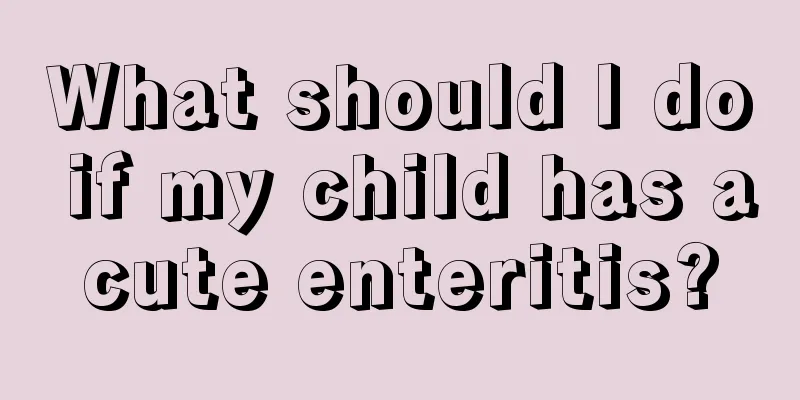What should I do if my child has acute enteritis?

|
The main symptoms of acute enteritis are diarrhea and vomiting, so many parents mistakenly think it is just diarrhea and delay the treatment. Acute enteritis in children is very serious and may cause symptoms such as nausea, vomiting, abdominal pain, and diarrhea, and requires timely treatment. So how should acute enteritis in children be treated? Next, let’s talk about how to deal with acute enteritis in children. First, parents should send their baby's stool for examination in time: It is best to keep a stool box used for routine stool testing in the hospital at home. It is best not to scrape the stool on the diaper. It is best to send the stool for examination within half an hour after collecting it. In order to be timely and effective, parents can choose to send the specimens to a nearby hospital for testing. Second, the use of antibiotics: If white blood cells can be seen in stool tests, it is mostly an invasive bacterial infection. It is best to use antibiotics, and the medication should be stopped only after three routine stool tests are negative. Do not stop the medication too early. When antibiotic treatment is ineffective or the disease recurs, stool culture should be done in time to understand the type of bacteria and whether they are resistant to drugs. If no white blood cells are found in the stool test, it is mostly a viral infection or non-infectious diarrhea. Antibiotics may not be used for the time being, and oral drugs such as Mommy Love and Smecta can be used for supportive treatment. Third, in acute diarrhea, the most serious situation is dehydration and electrolyte acid-base imbalance. If the baby's stool contains a lot of water and has frequent diarrhea, or is accompanied by vomiting and poor appetite, it is very likely to be combined with dehydration and electrolyte acid-base imbalance. At this time, you should go to the hospital for treatment in time. For mild cases, oral rehydration salts can be taken under the guidance of a doctor. Severe cases require intravenous drip rehydration. Otherwise, shock and renal failure may occur. Fourth, sometimes after acute enteritis, the baby’s intestinal mucosa is damaged, which may cause temporary lactose intolerance and lead to prolonged diarrhea. At this time, the special diarrhea milk powder should be replaced in time, otherwise the diarrhea will be difficult to improve. The above article introduces some countermeasures for acute enteritis in children. In addition to these treatment methods, we also need to improve the child’s diet. Pay attention to keeping the abdomen warm. Do not eat overnight or cold food. Eat more easily digestible and stomach-nourishing food, such as noodles, rice soup, millet porridge, etc. Do not eat irritating food and raw or cold food. |
<<: What are the causes of fetal renal cysts?
>>: What kind of milk powder is good for babies with allergies?
Recommend
How to solve the problem of children sleeping restlessly at night
When going to bed at night, everyone certainly ho...
Symptoms and hazards of small intestinal hernia in children
Parents with young children at home must be wonde...
Why do children sweat at night?
It is said that children are the treasure of thei...
What should I do if my newborn has white spots on his face?
Many parents report that their newborns have whit...
At what age is it appropriate to perform circumcision on children?
Nowadays, many babies may go to the hospital for ...
Symptoms of autism in babies
Even now, we can observe that very young babies h...
Methods for regulating the spleen and stomach in children
Regulating the spleen and stomach is not just a m...
Vitamin supplements for children
For children's physical health, the supplemen...
What should I do if my baby’s upper eyelids droop?
It is said that eyes are windows to the soul, and...
Symptoms of rickets in babies
Parents need to pay attention to the baby's b...
What is the height and weight of a 2-year-old and 8-month-old girl?
A baby is increasingly becoming a symbol of a fam...
Urticaria on the child
Urticaria occurs in a wide range of areas. In add...
What kind of medicine is good for infant skin itching
When the seasons change and during the dry season...
What to do if a 12-year-old girl is too fat
If a 12-year-old girl is too fat, it is often rel...
1 and a half year old baby walking unsteadily
Every change in the baby after birth is watched b...









